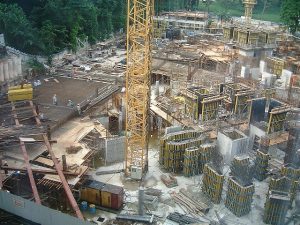A letter writer to the Straits Times forum page has asked authorities here to consider policies which will put an end to the practice of selling private apartments before they are finished in order to curb property speculations. The letter writer, Sum Kam Weng, asked the Government to consider measures the Guangdong provincial housing authority is studying to curb property speculations.
The Bloomberg reported in late September that China’s Guangdong province is considering a proposal to scrap a housing pre-sale system that’s become a major avenue for developers to finance projects. The report said that Guangdong’s housing authority is soliciting developers’ views on phasing out the system in order to curb property speculation and excessive borrowings.

Pre-sales of uncompleted private homes allow developers to receive funding upfront by selling apartments before construction has been completed. Chinese developers been using these funds to invest in other projects elsewhere, or start new ones. The report said Chinese authorities want to move away from the pre-sales system to limit risks in China’s real estate market, which by some estimates accounts for as much as 20 percent of the country’s gross domestic product.
The Guangdong provincial housing authority contends that the current system fuels excessive property investment, property speculations and has attracted incompetent players into the industry.
Table of Contents
Pointing out that there is a vast price disparity between existing properties and projects under construction, Sum asked authorities here to “consider imposing similar restrictions on all future Government Land Sales sites and require developers to market their respective projects only upon their completion and the issuance of the temporary occupation permit.”
“The main reason is forward pricing for a brand-new development. But the ease of getting loans to buy a new project as long as buyers comply with the requirements of the total debt servicing ratio makes it attractive. Buyers of new developments are granted loan amounts based on the contracted purchase price, whereas buyers of existing properties are granted loan amounts based on banks’ conservative valuations, which are affected by factors such as recent transacted prices and the prevailing economic condition.”
Sum said such a measure if adopted by the Singapore Government, will curb property speculations as developers will stop “punting on the property market and bidding huge amounts for land when the completed units will be ready for sale in only four or five years’ time.”
Regulation which allows for only completed private homes to be put on the real estate market will bring about more transparency to the property market Sum argues, as prices will be based on completed units and reflect the prevailing market conditions. The move will also allow for better projection of private homes here. It will further give developers the impetus to keep to construction schedules and launch the sales of completed units as planned.
https://www.icompareloan.com/resources/singapore-private-home-prices/
“As Singapore is a land-scarce state, we should be bold and implement policies that will ensure that the local property market grows at a positive but sustainable pace without the exuberance and risks related to the wild swings of the market,” Sum said.
The Singapore Government introduced new property cooling measures in early July to curb property market euphoria. Real estate stakeholders have slammed the new measures as being unnecessary and premature. The Minister for National Development recently said that “the Government will continue to monitor trends in the property market, and adjust (its) policies as necessary, to maintain a stable and sustainable property market.”
Paul Ho, chief mortgage consultant at the icompareloan.com, said every market has some punters and the real estate market is not immune from these who indulge in property speculations.
What is more worrisome than property speculations is the unpredictable nature of if bank loans for genuine buyers of private homes will be sanctioned. The uncertainties of if a mortgage loan would be approved have been further magnified after the new property cooling measures. This is one major reason why buyers must use the services of mortgage consultants.
https://www.icompareloan.com/resources/mortgage-broker-singapore-best-rate/
Ho said: “Mortgage consultants will be able to assess the buyers Mortgage Service Ratio (MSR) and Total Debt Servicing Ratio (TDSR) to gauge the buyers’ financial risk profile and advise on a suitable loan package. This will save them the hassle of running around, going to a bank that does not offer a loan for their housing type or ther personal profile, – not knowing what documents are needed, having to make 5-10 loan application and even the possibility of impacting the process of your home purchase.”
How to Secure a Home Loan Quickly
If you are concerned about property speculations driving up prices of private homes, and unsure if you qualify for mortgage loans, our mortgage consultants at iCompareLoan can set you up on a path that can get you a home loan in a quick and seamless manner.
Our consultants have close links with the best lenders in town and can help you compare Singapore home loans and settle for a package that best suits your home purchase needs. Find out money saving tips here.
Whether you are looking for a new home loan or to refinance your existing one, the Mortgage broker can help you get everything right from calculating mortgage repayment, comparing interest rates all through to securing the best home loans in Singapore. And the good thing is that all our services are free of charge. So it’s all worth it to secure a loan through us.
For advice on a new home loan.
For refinancing advice.






